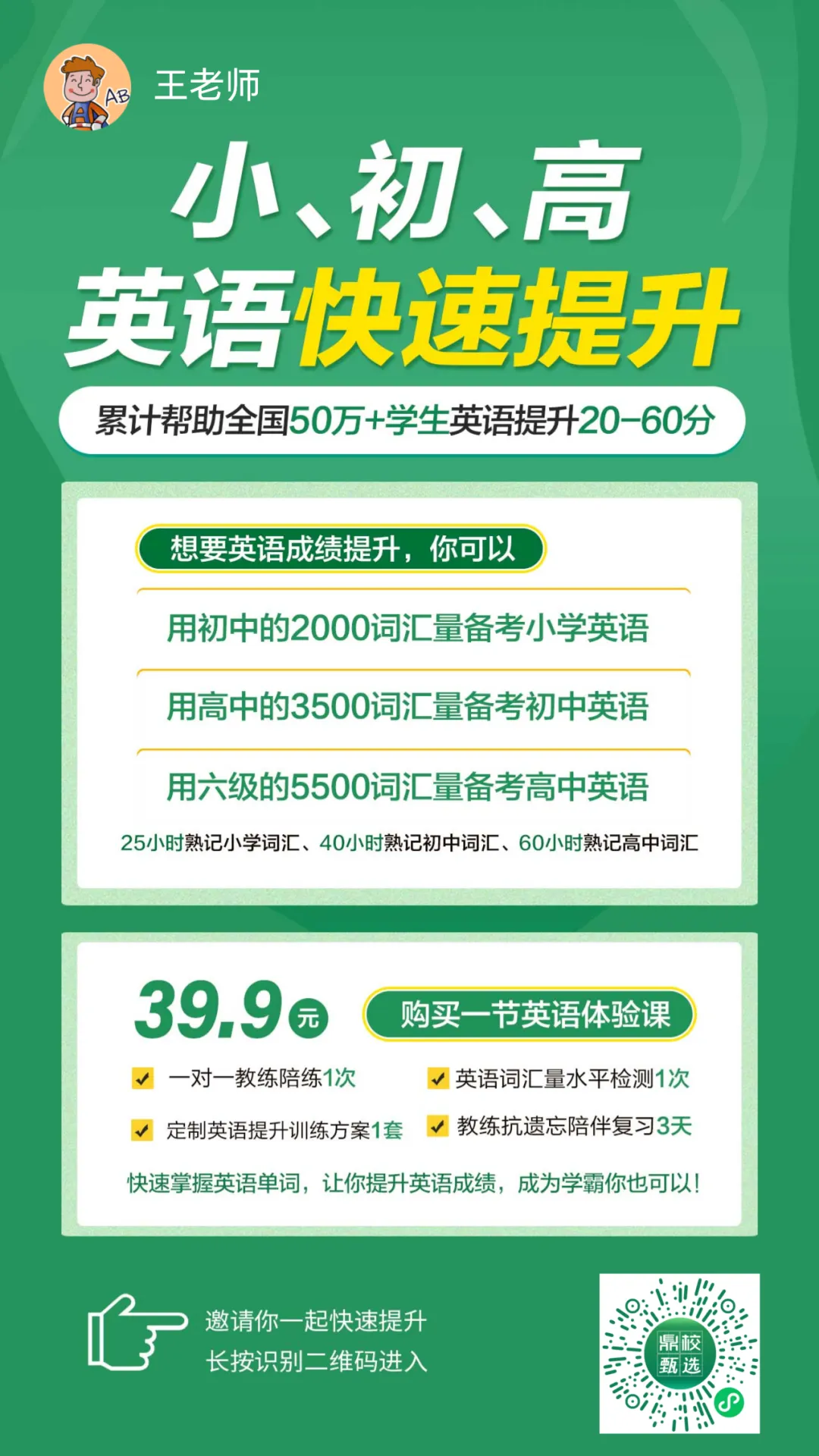小学英语易错知识大汇总,看看你都掌握了没?

1. 让我来帮你完成工作吧。
× Let me help you to do your work.
√ Let me help you with your work.
2. 我建议你去休个长假。
× I recommend you to take a long vacation.
√ I recommend that you take a long vacation.
3. 过来。
× Come to here.
√ Come here.
4. 太阳从东方升起。
× The sun rises from the East.
√ The sun rises in the East.
5. 小偷是从窗户爬进来的。
× The thief got in from the window.
√ The thief got in through the window.
6. 让我们从第10页开始。
× Let's begin from page 10.
√ Let's begin at(on) page 10.
7. 我耐心有限。
× There is a limit in my patience.
√ There is a limit to my patience.
8. 请在白线内等待。
× Please wait inside the white line.
√ Please wait behind the white line.
9. 你家房子买了火险吗?
× Is your house insured for fire?
√ Is your house insured against fire?
10. 我没地方住。
× I have no house to live.
√ I have no house to live in.
11. 脸好脏!照照镜子。
× What a dirty face! Look at the mirror.
√ What a dirty face! Look in the mirror.
12. 这是我房间门钥匙。
× This is the key of my room.
√ This is the key to my room.
13. 我准备去上一个为期两年的英语课程。
× I am going to take a two-year course of English.
√ I am going to take a two-year course in English.
14. 末班车11点开,现在已经快11点了,赶紧的!
× The last bus leaves at eleven o'clock. It's about eleven now, Hurry!
√ The last bus leaves at eleven o'clock. It's nearly (almost) eleven now, Hurry!
15. 把手从电线末端挪开。
× Leave your hand from the end of the wire.
√ Let go of the end of the wire.
16. 靠右走。
× Keep the right.
√ Keep to the right.
17. 不关你的事。
× It is not of only your business.
√ It is none of your business.

Conjunction Use
连词用法
1. 和我不一样,她对英语很精通。
× Different from me, she is proficient in English.
√ Unlike me, she is proficient in English.
2. 莫妮卡,借我点钱吧,比方说500美元。
× Lend me some money, for instance 500 dollars, Monika.
√ Lend me some money, say 500 dollars, Monika.
3. 去年夏天我本想去欧洲,但费用太高于是放弃了。
× I wanted to go to Europe last summer, but it was too expensive so I gave up to go.
√ I wanted to go to Europe last summer, but it was too expensive so I gave up the idea.
4. 我就是这样做的。
× This is the way how I did it.
√ This is how I did it. or This is the way I did it.
5. 我来这儿的路上遇到了交通事故,所以迟到了。
× There was a traffic accident on my way here. It is why I was late.
√ There was a traffic accident on my way here. That is why I was late.
6. 他们不理解我的想法。
× hey didn't understand my mind.
√ They didn't understand what I was thinking.
7. 无论是他们还是我都不对这个错误负责。
× Neither they nor I are to blame for this mistake.
√ Neither they nor I am to blame for this mistake.

1. 去哪儿都行。
× Anywhere will do.
√ Any place will do.
2. 会议定在今天下午3点召开。
× The general meeting is scheduled to be held this afternoon at three.
√ The general meeting is scheduled to be held at three this afternoon.
3. 昨天早上在费尔大街,她偶遇了她的男朋友。
× She ran into her boyfriend yesterday morning in Fair Avenue.
√ She ran into her boyfriend in Fair Avenue yesterday morning.
4. 不要对我抱太多期望。
× Don't expect me too much.
√ Don't expect too much from (of) me.
5. 给我点钱吧,如果你有的话。
× Give me money, if you have.
√ Give me money, if you have any.
6. 他待我十分友好。
× He treated me very friendly.
√ He treated me in a friendly way.

1. 你就是在这点上弄错了。
× This is where you mistake.
√ This is where you are mistaken.
2. 我哥哥一直在忙着准备期终考试。
× My brother has been busy in preparing for his final examination.
√ My brother has been busy preparing for his final examination.
想学习更多英语知识,请关注小学英语xscyy
3. 劳拉用了半天时间复习功课。
× Laura has spent half a day to revise her lessons.
√ Laura has spent a half day revising her lessons.
4. 我习惯了开灯看电视。
× I am used to watch television with the light on.
√ I am used to watching television with the light on.
5. 饭后,母亲提议去散步。
× After dinner, my mother suggested to go for a walk.
√ After dinner, my mother suggested going for a walk.
6. 政府正在考虑在伦敦新建一个机场的可能性。
× The government is considering the possibility to build a new airport in London.
√ The government is considering the possibility of building a new airport in London.
7. 他的新书将大卖。
× His new book will be sold well.
√ His new book will sell well.
8. 我有很多活要干。
× I have a lot of work to be done.
√ I have a lot of work to do.
9. 孩子们当时处境非常危险,一个杀气腾腾的疯子正挥着刀在幼儿园里乱跑。
× The children were very dangerous as the knife-wielding madman was running amok in the kindergarten.
√ The children were in great danger as the knife-wielding madman was running amok in the kindergarten.

1. 你的外套破了。
× Your coat is broken.
√ Your coat is torn.
2. 总之苏珊没犯错。
× Susan didn't make a fault anyway.
√ Susan didn't make a mistake anyway.
3. 能借你电话用下吗?
× May I borrow your phone?
√ May I use your phone?
4. 他有所好转。
× He becomes better.
√ He got better.
5. 外面天还亮。
× It was still bright outside.
√ It was still light outside.
6. 在美国一般学生都不穿校服。
× Common students in U.S. don't wear a uniform.
√ The average students in U.S. don't wear a uniform.
7. 这道色拉是谁做的?
× Who cooked this salad?
√ Who made this salad?
8. 让我给你把把脉。
× Let me examine your pulse.
√ Let me feel your pulse.
9. 我把帽子忘在屋里了。
× I forget my hat in the house.
√ I left my hat in the house.
10. 你上过大学吗?
× Did you attend college?
√ Did you go to college?
11. 他的体温降下来了。
× His temperature went down.
√ His temperature came down.
12. 今天的报纸上有他写的关于香港的文章。
× Today's newspapers has his articles on HongKong.
√ Today's newspapers carries his articles on HongKong.
13. 开窗睡你会感冒的。
× You'll have a cold if you sleep with your window open.
√ You'll catch a cold if you sleep with your window open.
14. 我去医院探望了她生病的母亲。
× I visited her ill mother in the hospital.
√ I visited her sick mother in the hospital.
15. 她是第一名。
× She was first prize.
√ She took first prize.
16. 他失去意识很长时间了。
× He lost consciousness for a long time.
√ He was unconscious for a long time.
17. 他创造了世界纪录。
× He made a world record.
√ He set a world record.
18. 她婚姻幸福。
× Her marriage was happy.
√ Her married life was happy.
19. 今年夏天我要去自己的出生地看看,这是10年来的第一次。
× I'll visit my native place for the first time in ten years this summer.
√ I'll visit my birth place for the first time in ten years this summer.
20. 这个座位有人吗?
× Is this seat empty?
√ Is this seat taken?
21. 我看他面熟。
× I know his face.
√ I know him by sight.
22. 我的手表不走了,我得拿去检查下。
× My watch doesn't move at all. I must get it checked up.
√ My watch isn't running, I must get it checked up.
写出完全形式:
1.who's=who is
2.she's = she is
3.he's = he is
4.what's = what is
5. where’s= where is
6.we're = we are
7.you're = you are
8.that's = that is
9. I'm = I am
10. isn't = is not
11.aren't = are not
12.they're = they are
13.don't = do not
14.let's = let us
15. can’t = can not
16. it's = it is
17. I’ve = I have
18. I’d = I would
19. hasn’t = has not
写出下列单词的复数形式:
1.bus —— buses
2.box —— boxes
3.glass —— glasses
4.class —— classes
5.watch —— watches
6.mango —— mangoes
7.firefly —— fireflies
8.sheep —— sheep
9.people —— people
10.man —— men
11.woman —— women
12.apple —— apples
13.family —— families
14.library —— libraries
15.baby —— babies
16.boy —— boys
17.toy —— toys
18.child —— children
19.foot —— feet
20.strawberry —— strawberries
21.horse —— horse
22.policeman —— policemen
23.dress —— dresses
24. fish —— fish
25.tooth —— teeth
26.country —— countries
27. foot —— feet
28.dragonfly —— dragonflies
29.me —— us
30.building —— buildings
31. cloth —— clothes
32. this —— these
33. that —— those
34.circle —— circles
35.story —— stories
反义词或对应词:
1.same —— different
2.new ——old
3.old ——young
4.short —— long
5.big ——small
6.tall —— short
7.yes —— no
8.open —— close
9.hot —— cold
10.here —— there
11.sit ——stand
12.up ——down
13.thin ——fat
14.father —— mother
15.right —— wrong
16.black ——white
17.this —— that
18.these —— those
19.boy —— girl
20. grandfather——grandmother
21.man ——woman
22.husband —— wife
23.aunt——uncle
24.brother——sister
25. he —— she
26. left —— right
27. go——come
28.nurse ——doctor
29. good ——bad
30. minus —— plus
31. his —— her
32. busy—— free
33. hand ——foot
34. legs —— arms
近义词:
1. desk—— table
2. like—— love
3. often—— usually
4. start—— begin
5. great—— good
同音词:
1. to too 、 two
2. right write
3. no know
4. for four
5. hear here
6. I eye
7. see (C) sea
8. son sun
9. be (B) bee
10. there their
11. U you
12. Y why
13. by buy 、 bye
14. pair pear
15. R are
16. whose who’s
17. aunt aren’t
现在分词:
1. swim ( 现在分词 )—— swimming
2. come( 现在分词 )—— coming
3. dance (-ing形式)—— dancing
4. ski (-ing形式) ——skiing
5. sit (-ing形式)—— sitting
6. fly (-ing形式) —— flying
7. stay (-ing形式) —— staying
8. travel (-ing形式) ——travelling
9. cry (-ing形式) ——crying
10. play (-ing形式) —— playing
11. listen (-ing形式) —— listening
12. collect (-ing形式) —— collecting
13. make (-ing形式) —— making
14. take (-ing形式) —— taking
15. write (-ing形式)—— writing
16. read(-ing形式) ——reading
17. clean (-ing形式) —— cleaning
18. sing (-ing形式)—— singing
19. sweep (-ing形式) —— sweeping
20. run (-ing形式) ——running
综合:
1. study (第三人称单数)—— studies
2. students(名词所有格)——students’
3. sister(名词所有格)——sister’s
4. two(序数词) —— second
5. have(第三人称单数)—— has
6. cat (名词所有格) —— cat’s
7. Tom(名词所有格) ——Tom’s
8.teacher(动词) —— teach
9. cry(第三人称单数) ——cries
10.Nancy(名词所有格) —— Nancy’s
11. can(否定式) —— can’t
12. good(比较级)——better
13.catch(第三人称单数) ——catches
14. wash (第三人称单数)——washes
15. quickly(形容词) —— quick
16. visit(名词) ——visitor
17. China(形容词) —— Chinese
18. French(名词) —— France
19. quiet(副词) ——quietly
20. one(序数词) —— first
21. cook(第三人称单数) ——cooks
22. do(第三人称单数) ——does
23. beautifully(形容词) ——beautiful
24. many (比较级) ——more
25. Australian(名词)—— Australia
26. brush(第三人称单数) —— brushes
27. work(名词)——worker

鼎校政策咨询入口
▼

鼎校智能英语加盟费咨询